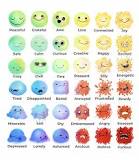The Power of Emotions: Understanding the Human Experience
Emotions are the essence of our humanity, shaping our thoughts, actions, and relationships. From joy to sorrow, anger to love, emotions color our world and give depth to our experiences. Understanding the complexities of emotions is key to navigating the intricate tapestry of human interactions.
The Spectrum of Emotions
Emotions encompass a broad spectrum, ranging from basic feelings like happiness and sadness to more nuanced states such as nostalgia and awe. Each emotion serves a purpose, providing valuable insights into our inner selves and external environment. By acknowledging and embracing our emotions, we gain a deeper understanding of who we are and how we relate to others.
The Influence of Emotions
Emotions have a profound impact on our thoughts and behaviors. They can motivate us to achieve great feats or hinder our progress with fear and doubt. The way we perceive and express our emotions shapes our relationships with others, influencing communication, empathy, and connection. By harnessing the power of emotions, we can cultivate emotional intelligence and enhance our emotional well-being.
Emotions in Art and Culture
Artists throughout history have captured the essence of human emotions through their creations. Paintings, literature, music, and performances serve as powerful mediums for expressing complex feelings that words alone cannot convey. Similarly, cultural practices and traditions reflect the significance of emotions in shaping societal norms and values.
Navigating Emotional Complexity
While emotions enrich our lives with meaning and depth, they can also pose challenges when left unchecked. Learning to regulate emotions effectively is essential for maintaining mental health and fostering positive relationships. By practicing mindfulness, self-awareness, and emotional resilience, we can navigate the complexities of emotions with grace and authenticity.
The Journey Within
Exploring our emotional landscape is a journey of self-discovery that requires introspection, vulnerability, and courage. By embracing all facets of our emotional selves—the light and the shadow—we embark on a path towards greater self-acceptance and personal growth. Through this journey within, we uncover the transformative power of emotions in shaping our lives.
The 7 Benefits of Emotions: Enriching Human Experience and Fostering Growth
- Emotions provide depth and richness to our human experience.
- They serve as valuable signals that help us understand our needs and desires.
- Emotions enhance communication by conveying subtle nuances of our thoughts and feelings.
- They strengthen social bonds by fostering empathy, connection, and intimacy.
- Emotions fuel creativity and inspire artistic expression in various forms.
- They contribute to personal growth by offering insights into our values, beliefs, and motivations.
- Emotions promote mental well-being through self-awareness, emotional regulation, and resilience.
Seven Drawbacks of Emotions: Navigating the Challenges of Emotional Influence
- Emotions can cloud judgment and lead to irrational decision-making.
- Intense emotions can be overwhelming and difficult to control.
- Negative emotions, such as anger or jealousy, can strain relationships and lead to conflicts.
- Suppressing emotions can have detrimental effects on mental and physical health.
- Emotional volatility can hinder productivity and focus in professional settings.
- Certain emotions, like fear or anxiety, can inhibit personal growth and limit one’s potential.
- Emotions are subjective and can vary greatly from person to person, leading to misunderstandings and miscommunications.
Emotions provide depth and richness to our human experience.
Emotions are the vibrant hues that paint the canvas of our human experience, infusing it with depth and richness. They add layers of meaning to our interactions, memories, and perceptions, shaping the tapestry of our lives in intricate ways. From the warmth of love to the bittersweetness of nostalgia, emotions color our world with a spectrum of feelings that evoke empathy, passion, and connection. By embracing the complexity of our emotional landscape, we invite a deeper understanding of ourselves and others, enriching our journey through life with profound moments of joy, sorrow, and everything in between.
They serve as valuable signals that help us understand our needs and desires.
Emotions serve as valuable signals that help us understand our needs and desires. When we experience emotions such as joy, sadness, anger, or fear, they provide us with important insights into our innermost thoughts and feelings. By paying attention to these emotional cues, we can identify what truly matters to us and what we may be lacking in our lives. Emotions guide us towards fulfilling our needs and pursuing our desires, acting as a compass that directs us towards a more authentic and fulfilling existence.
Emotions enhance communication by conveying subtle nuances of our thoughts and feelings.
Emotions play a vital role in enhancing communication by conveying subtle nuances of our thoughts and feelings. Through the expression of emotions such as joy, sadness, excitement, or concern, we add depth and richness to our interactions with others. Emotions act as a bridge that connects individuals on a deeper level, allowing for a more authentic exchange of ideas and experiences. By embracing and articulating our emotions effectively, we can communicate not just the words we speak but also the underlying sentiments that shape our perspectives and relationships.
They strengthen social bonds by fostering empathy, connection, and intimacy.
Emotions play a vital role in strengthening social bonds by nurturing empathy, fostering connection, and deepening intimacy between individuals. Through shared emotional experiences, people develop a greater understanding of each other’s feelings and perspectives, leading to increased empathy and compassion. Emotions serve as a bridge that connects hearts and minds, creating meaningful connections that transcend barriers of communication and differences. By expressing and reciprocating emotions, individuals cultivate trust, build relationships based on mutual understanding, and experience profound moments of intimacy that solidify their social bonds.
Emotions fuel creativity and inspire artistic expression in various forms.
Emotions serve as a powerful catalyst for creativity, igniting the spark of inspiration that drives artistic expression in its myriad forms. Whether it’s the raw intensity of passion, the bittersweet hues of nostalgia, or the tranquil whispers of serenity, emotions infuse art with depth, meaning, and resonance. Artists channel their innermost feelings into their creations, transforming abstract emotions into tangible works that resonate with audiences on a profound level. Through this alchemical process of emotional transmutation, creativity flourishes and art becomes a mirror reflecting the rich tapestry of human experience.
They contribute to personal growth by offering insights into our values, beliefs, and motivations.
Emotions play a crucial role in personal growth by providing valuable insights into our values, beliefs, and motivations. Through our emotional responses to various situations and experiences, we gain a deeper understanding of what truly matters to us and why certain things resonate with us on a profound level. By reflecting on our emotions, we can uncover hidden truths about ourselves, identify areas for self-improvement, and align our actions with our core values. Embracing the wisdom that emotions offer allows us to evolve as individuals, cultivate authenticity, and pursue a path of meaningful personal development.
Emotions promote mental well-being through self-awareness, emotional regulation, and resilience.
Emotions play a crucial role in promoting mental well-being by fostering self-awareness, emotional regulation, and resilience. Through self-awareness, individuals gain insight into their thoughts, feelings, and behaviors, allowing them to better understand their inner world and navigate life’s challenges. Emotional regulation enables individuals to manage their emotions effectively, preventing overwhelming feelings from taking control and maintaining a sense of balance. Additionally, cultivating emotional resilience empowers individuals to bounce back from setbacks, adapt to change, and cope with stressors more effectively. By embracing and harnessing the power of emotions, individuals can enhance their mental health and build a strong foundation for overall well-being.
Emotions can cloud judgment and lead to irrational decision-making.
Emotions have the potential to cloud judgment and steer individuals towards irrational decision-making. When overwhelmed by intense feelings such as fear, anger, or love, individuals may struggle to maintain objectivity and rationality in their choices. Emotions can distort perceptions, magnify biases, and hinder critical thinking processes, resulting in decisions that are based more on impulse than on sound reasoning. It is crucial for individuals to recognize the influence of emotions on their decision-making processes and strive to cultivate emotional intelligence to navigate challenges with clarity and balance.
Intense emotions can be overwhelming and difficult to control.
Intense emotions can be overwhelming and difficult to control, often leading to heightened stress and inner turmoil. When strong feelings such as anger, fear, or sadness take hold, they can cloud judgment and impair rational thinking, making it challenging to navigate daily challenges effectively. The intensity of these emotions may also strain relationships and impact overall well-being, creating a sense of emotional chaos that can be hard to manage. Finding healthy coping mechanisms and seeking support are essential steps in addressing the conundrum of overwhelming emotions and regaining a sense of balance and stability.
Negative emotions, such as anger or jealousy, can strain relationships and lead to conflicts.
Negative emotions, such as anger or jealousy, have the potential to strain relationships and escalate conflicts. When left unchecked, these emotions can cloud judgment, fuel irrational behavior, and erode trust between individuals. Anger may result in outbursts of aggression, while jealousy can breed resentment and insecurity. The destructive impact of negative emotions on relationships underscores the importance of emotional awareness, communication, and conflict resolution skills in fostering healthy and harmonious connections with others.
Suppressing emotions can have detrimental effects on mental and physical health.
Suppressing emotions can have detrimental effects on mental and physical health. When individuals suppress their emotions instead of acknowledging and processing them, it can lead to increased stress, anxiety, and even depression. Emotions that are pushed aside or ignored may manifest in harmful ways, such as psychosomatic symptoms, chronic pain, or emotional outbursts. Over time, the build-up of suppressed emotions can take a toll on one’s overall well-being, affecting both mental clarity and physical vitality. It is essential to address and express emotions in a healthy manner to maintain a balanced and harmonious state of being.
Emotional volatility can hinder productivity and focus in professional settings.
Emotional volatility, characterized by unpredictable and intense emotional fluctuations, can significantly impede productivity and focus in professional settings. When individuals struggle to regulate their emotions effectively, they may become easily overwhelmed by stress, frustration, or anxiety, leading to impaired decision-making and interpersonal conflicts. In a work environment that demands concentration and efficiency, emotional instability can disrupt workflow, hinder collaboration, and undermine overall performance. Addressing emotional volatility through self-awareness, stress management techniques, and seeking support can help individuals navigate challenges effectively and cultivate a more conducive work environment for optimal productivity.
Certain emotions, like fear or anxiety, can inhibit personal growth and limit one’s potential.
Certain emotions, such as fear or anxiety, have the potential to act as barriers to personal growth and hinder one’s ability to reach their full potential. When individuals are consumed by fear or overwhelmed by anxiety, they may become paralyzed by uncertainty and doubt, preventing them from taking risks or pursuing new opportunities. These emotions can create a cycle of avoidance and self-doubt, leading to missed chances for growth and development. By recognizing the impact of these limiting emotions and actively working to address them through self-awareness and resilience, individuals can break free from their constraints and open themselves up to new possibilities for personal advancement.
Emotions are subjective and can vary greatly from person to person, leading to misunderstandings and miscommunications.
Emotions, being inherently subjective, can vary significantly from one individual to another, often resulting in misunderstandings and miscommunications. What one person perceives as a minor issue might evoke strong emotions in another. These differences in emotional responses can create barriers to effective communication and interpersonal relationships, as individuals may struggle to empathize with or comprehend the feelings of others. Such subjectivity underscores the importance of emotional intelligence and empathy in navigating the complexities of human emotions and fostering mutual understanding.





